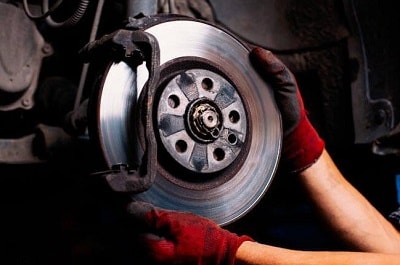Why are My Brakes Squeaking? Squeaky brakes are probably more common than you realize. Every day, hundreds of drivers throughout the West Palm Beach, Boynton Beach, and Delray Beach areas step on their brake pedal and hear a squeaky or squealing noise. Many people instantly assume that means there's something seriously wrong. The truth is there are a lot of reasons why you might experience this kind of noise.
The next time you wonder, "Why are my brakes squeaking?" the first thing to do is remain calm. Don't panic; it's generally not a warning of imminent disaster and some brake noise might even be normal. Still, it's good to understand the different causes of this noise so that you can take the right steps if something does need to be addressed.
Reasons for Squeaky Brakes

The answer to, "Why are my brakes squeaking?" is tied up in how your brakes are constructed. Your brakes are made up of multiple parts, including pads, rotors, clips, and a range of other parts that all come together to allow your car to work properly. Squeaking brakes can sometimes be caused by the simplest issues which might not even affect the way your system works. On the other hand, they can also be an indicator that you need new brakes.
Brake Dust
Often when you get new brakes, there can be small particles or road dust that gets in between the pads and rotors. This can cause a squeaking sound which often will abate within a few days or weeks of regular driving. It's a very common thing that usually isn't anything to worry about.
Worn Brake Pads
Your brake pad has steel backing, with a special material attached that creates friction when the calipers clamp the pads down on the rotors. This friction is what slows your car down. When the friction begins to wear down, many (though not all) brakes will have wear indicators (sometimes referred to as screech pads), formed by small clips made of spring steel. When this clip contacts the rotor, it makes the squealing noise to tell you it's time to change the brakes.
Glazed Rotors and Pads
When too much heat is generated, usually because your calipers get stuck and the brakes don't fully release, they can get glazed and crystallized so that they become smooth. This can cause squealing sound as the incredibly hard, smooth surfaces constantly rub. It's essential if this happens to get your brakes replaced.
Lack of Insulation
Your brakes are insulated via shims placed against the rear of the pad to help protect it from the caliper. The shims used for this insulation wear out or get discarded when you get your brakes replaced. If the shims aren't replaced with gel or new shims, you'll hear squeal.
Rotor Surfaces
Whenever you get a brake job, the technician will recommend resurfacing or replacing the rotors. This is necessary to ensure that the rotors provide the best connection with the pads. When the rotor surface isn't true, squealing can result.
Brake Service at Audi West Palm Beach
The next time your brakes are acting up and you'd like to get them checked in the Delray Beach, West Palm Beach, or Boynton Beach regions, the answer is right around the corner. Contact the service center at Audi West Palm Beach for fast, expert brake service today.
